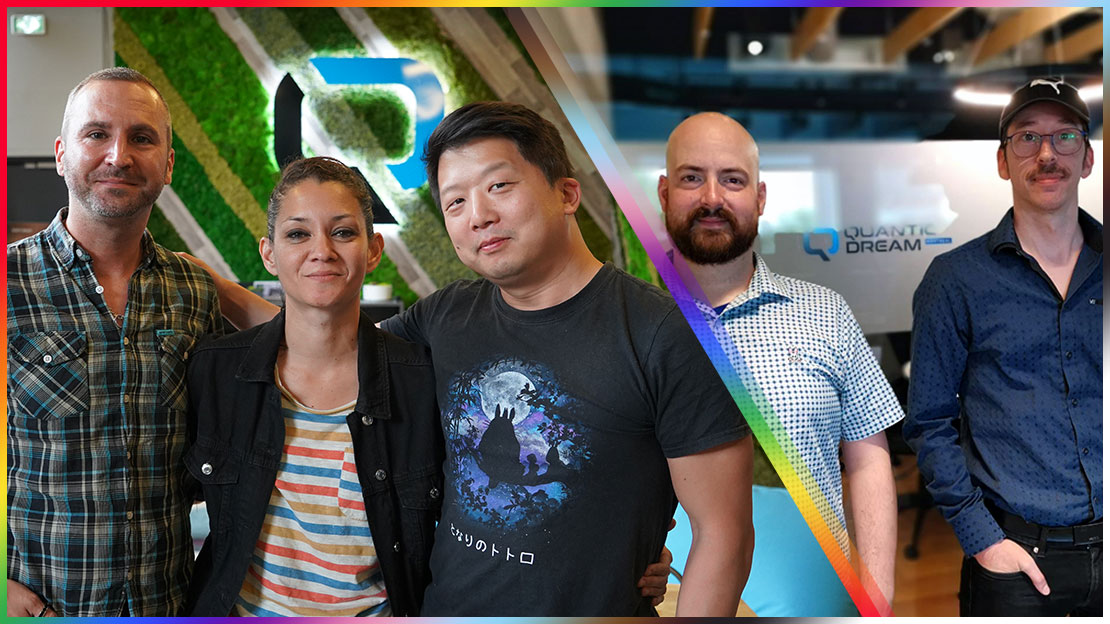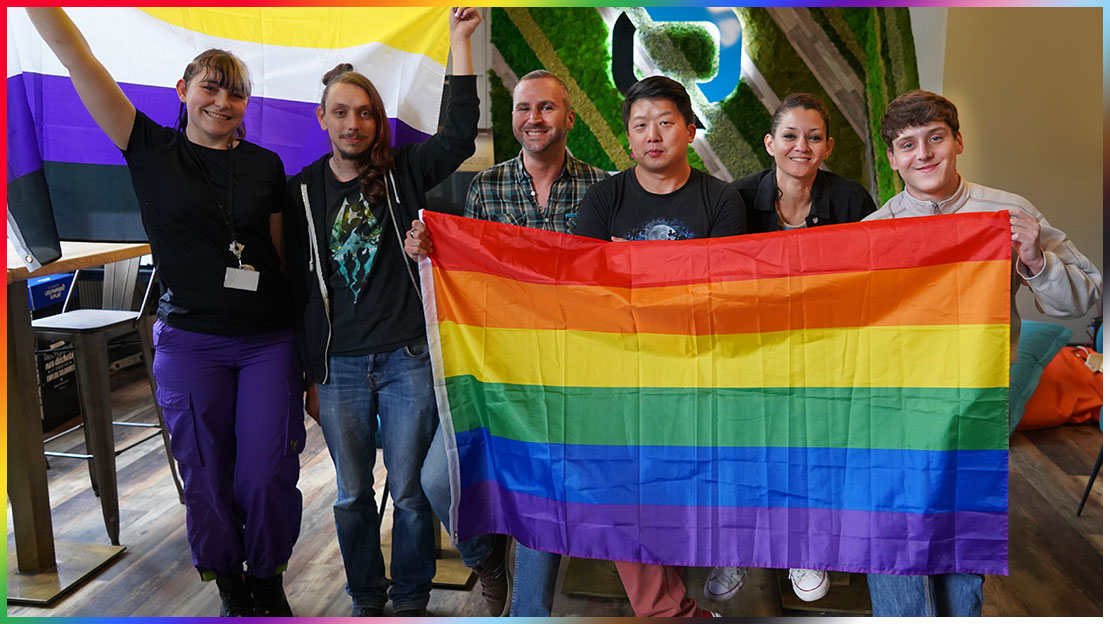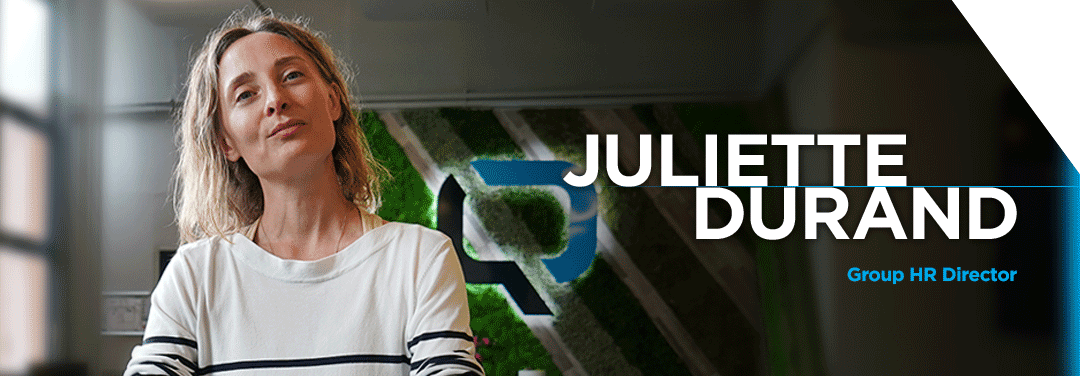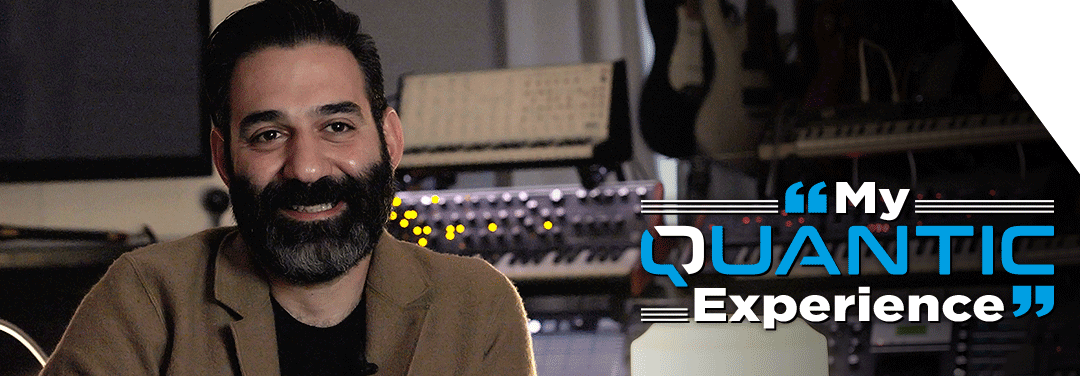QUANTIC PRIDE!
Pride Month is a reminder to celebrate diversity, a core strength of the gaming world, although we must not forget that giving everyone a chance to have their voice heard is an ongoing process. Quantic Dream’s LGBTQIA+ community recently decided to create a discussion group spread across the Paris and Montreal studios, to unify thoughts, cultivate dialogue within the teams, propose concrete actions, celebrate diversity, and raise awareness. Let’s meet with some of its spokespeople, Ingrid (Lead Animation Motion Kit, Paris), Sébastien (Lead Environment Artist, Paris), Hyun-Soo (3D Character Artist, Paris) and Benoit (Senior Gameplay Programmer, Montreal)!

Quantic Dream – Ingrid, you are the founder of the LGBTQIA+ group within Quantic Dream. What initially sparked the creation of the group?
Ingrid – I’ve been at Quantic Dream for over ten years, and although we’ve always talked freely about these topics with the whole studio and our community didn’t feel the need to formalise a group, it’s something I’ve wanted to initiate for a long time to exchange views and share our experiences. The trigger came at the beginning of 2022 with the reading of virulent external comments against the studio, which were difficult to read as an LGBTQIA+ member: I did not recognise myself in the image of Quantic Dream and the work environment portrayed by these critics. I remember thinking that we needed to talk about this and see what we could do about it.
Hyun-Soo – Especially when Star Wars EclipseTM was announced, everyone was overwhelmed with the outpouring of positive feedback. Yet, some external voices also commented on things about the studio that I wasn’t experiencing. We started a spontaneous internal email thread sent out to the whole studio to share the situation. Some of us naturally came out and asked if we could personally share what we were going through here because we thought it was unfair.
Benoit – The initiative came from Paris, but it was only natural for Serge (Senior Gameplay Programmer) and me in Montreal to participate as inclusion and openness are values we share.
Ingrid – The launch of a group that could truly represent us was simply a cry from the heart. The members wanted to positively and actively reflect on our experiences at Quantic Dream.
Sébastien – For me, it became necessary to make our voice heard. I was reading so many things that did not correspond to the studio’s values that I had known myself for over 14 years.
Quantic Dream – What does this group bring to the studio and the teams?
Hyun-Soo – Firstly, it allows anyone who wishes to express themselves on this subject to do so, privately or not. It also allows us to raise awareness, organise events and help people.
Ingrid – What touched me most when the group became official were the many messages of encouragement and even thanks from my colleagues for creating this initiative. I feel that it brings a clear sense of openness to the new generation of Quantic Dream that we, as spokespeople, have always known within the studio and now want to share.
Benoit – Having an LGBTQIA+ group gives visibility to the community and sends a message to people that they can truly be themselves at work.
Ingrid – It’s true that we first aim to listen and support people who need it; the individual experience is not universal. We also want to share this incredible world with our colleagues. Raising awareness internally on important commemorative dates, such as the International Day Against Homophobia, Biphobia and Transphobia, sharing educational and caring films, series or games that touch us, or even inviting everyone to celebrate Pride month “as a single team” are initiatives that already motivate us. I felt that we had made the right choice for our whole team by creating this group.

Quantic Dream – The representation of identities is a crucial issue, both in the studios and in the games themselves, but this has not always been the case. How do you perceive this evolution?
Ingrid – In video games, a range of different identities have always been represented! However, I was delighted in the past by games in which I felt represented, but I also lamented the caricatured, even comical way in which they were sometimes depicted. Mentalities towards this have progressed a lot. Thanks to a large number of more progressive media, culture and video games, we can now see the reflection of our multicoloured society, treated with respect. I am immensely proud that we have reached this stage and that there is a willingness to keep moving forward!
Benoit – The arts have indeed always played a crucial role in the evolution of mentalities. And because video games are artistic works in themselves, with a technological background, it is not surprising to see a richer representation of identities in modern games.
Hyun-Soo – And the more minorities are seen, the more they become normalised; at least, that’s how I feel with my family and at work. In fact, I had already come out to my team several years ago and I didn’t perceive any change, I just felt freer, and it was liberating for me. Then, when I came out to the rest of the studio, I received messages of encouragement and support, which truly moved me.
Sébastien – It is indeed a natural evolution of society. However, it must be done naturally to serve the issues clearly, without pressure; this is the best way to help the cause.
Quantic Dream – We’ve come a long way towards more inclusive video games, but are there still journeys to be made?
Hyun-Soo – It’s quite simple: as long as humans exist, we must continue to represent everyone because that’s part of humanity.
Ingrid – Indeed, it’s primarily society’s journey: many efforts have changed the way in which minorities are viewed. In France, the media, social networks, and many groups and associations can educate and inform us. Our laws are increasingly moving towards the acceptance of a rainbow society. These subjects, which were once exceptional, are finally becoming commonplace! Of course, I’m aware that there are still some very steep slopes to climb, but this enthusiasm toward fair inclusion is a very positive step for the future.
Benoit – The situation has improved a lot since I started my career, but it’s everyone’s job to build a healthy environment.
Sébastien – We see it every day: there is still a long way to go before everyone accepts our differences, whatever they may be. If video games can push the boundaries, it’s a significant step forward.
Ingrid – I’m still optimistic that we’ll get to a point where we’re fully immersed in a game for what it is, without questioning the identity of the characters we play.








